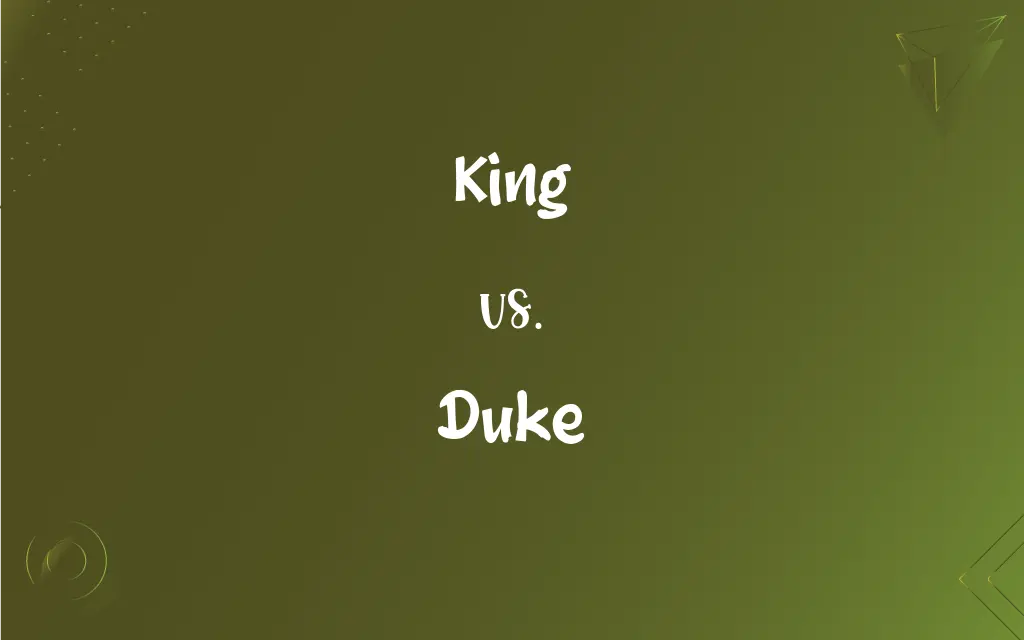King vs. Duke: What's the Difference?
By Janet White & Harlon Moss || Updated on May 29, 2024
A king is the highest-ranking monarch in a kingdom, exercising supreme authority, while a duke is a nobleman of high rank just below the monarch, governing a duchy.

Key Differences
A king holds the supreme authority in a monarchy, ruling over an entire kingdom and making final decisions on governance and law. In contrast, a duke is a nobleman ranked just below the king, often governing a region called a duchy and answering to the king.
The title of king is hereditary and typically passed down through a royal family, signifying the topmost level of nobility and sovereignty. A duke, however, while also inheriting their title, does not possess the same absolute power and often serves the king in various capacities.
Kings have historically had the power to levy taxes, command armies, and make or enforce laws across their entire realm. Dukes, on the other hand, exercise their authority within their duchy, managing local affairs, collecting taxes, and maintaining a military force that can be called upon by the king.
Ceremonially, kings are crowned with significant pomp and circumstance, symbolizing their ultimate power and divine right to rule. Dukes, while also enjoying considerable prestige and ceremonies, do not experience the same level of grandeur or public acknowledgment.
In terms of political influence, kings usually play a critical role in international diplomacy, forming alliances, and waging wars. Dukes may participate in these activities but usually at the behest or under the directive of the king, indicating their secondary status.
ADVERTISEMENT
Comparison Chart
Rank
Highest-ranking monarch
Nobleman just below the king
Authority
Supreme authority over a kingdom
Governs a duchy under the king's authority
Hereditary Status
Hereditary, passed down through royal lineage
Also hereditary, within noble families
Ceremonial Significance
Grand coronations and ceremonies
Significant but less grand than a king's
Political Influence
Central role in diplomacy and warfare
Supports king in diplomacy and warfare
ADVERTISEMENT
King and Duke Definitions
King
A male sovereign ruler of an independent state.
The king declared a new law for the kingdom.
Duke
A prominent figure in the feudal system.
The duke's castle was a symbol of his power.
King
The highest-ranking monarch in a country.
The king resides in the grand palace at the capital.
Duke
A nobleman of high rank below a king.
The duke managed the affairs of his duchy efficiently.
King
A supreme leader with ultimate authority.
The king's decision was final and binding.
Duke
A ruler of a territory called a duchy.
The duke's duchy was known for its rich culture.
King
A title for a male ruler in a monarchy.
The king's coronation was a historic event.
Duke
A high-ranking noble serving the king.
The duke was a close advisor to the king.
King
The central figure in a monarchy.
The king led his army into battle.
Duke
A nobleman with the highest hereditary rank, especially a man of the highest grade of the peerage in Great Britain.
King
A male sovereign.
Duke
A sovereign prince who rules an independent duchy in some European countries.
King
One that is supreme or preeminent in a particular group, category, or sphere
"In many countries, soccer is the king of sports" (Cameron W. Barr).
Duke
Used as the title for such a nobleman.
King
A man chosen as the winner of a contest or the honorary head of an event
A homecoming king.
Duke
Dukes(Slang) The fists
Put up your dukes!.
King
Abbr. K A playing card bearing the figure of a king, ranking above a queen.
Duke
(Botany) A type of cherry intermediate between a sweet and a sour cherry.
King
Abbr. K The principal chess piece, which can move one square in any direction and must be protected against checkmate.
Duke
To fight, especially with fists
Duking it out.
King
A piece in checkers that has been moved to the last row on the opponent's side of the board and been crowned, thus becoming free to move both forward and backward.
Duke
The male ruler of a duchy (female equivalent: duchess).
King
Kings(used with a sing. verb) See Table at Bible.
Duke
The sovereign of a small state.
King
A king-size bed.
Duke
A high title of nobility; the male holder of a dukedom.
King
Principal or chief, as in size or importance.
Duke
A grand duke.
King
Of or relating to a king-size bed
King sheets.
A king bed skirt.
Duke
Any of various nymphalid butterflies of the Asian genera Bassarona and Dophla.
King
To make (a piece in checkers) into a king; crown.
Duke
A fist.
Put up your dukes!
King
A male monarch; a man who heads a monarchy. If it is an absolute monarchy, then he is the supreme ruler of his nation.
Henry VIII was the king of England from 1509 to 1547.
Duke
To hit or beat with the fists.
King
A powerful or majorly influential person.
Howard Stern styled himself as the "king of all media".
Duke
To give cash to; to give a tip to.
I duked him twenty dollars.
King
Something that has a preeminent position.
In times of financial panic, cash is king.
Duke
A leader; a chief; a prince.
Hannibal, duke of Carthage.
All were dukes once, who were "duces" - captains or leaders of their people.
King
A component of certain games.
Duke
In England, one of the highest order of nobility after princes and princesses of the royal blood and the four archbishops of England and Ireland.
King
(chess) The principal chess piece, that players seek to threaten with unavoidable capture to result in a victory by checkmate. It is often the tallest piece, with a symbolic crown with a cross at the top.
Duke
In some European countries, a sovereign prince, without the title of king.
King
(card games) A playing card with the letter "K" and the image of a king on it, the thirteenth card in a given suit.
Duke
The fists; as, put up your dukes.
King
A checker (a piece of checkers/draughts) that reached the farthest row forward, thus becoming crowned (either by turning it upside-down, or by stacking another checker on it) and gaining more freedom of movement.
Duke
To play the duke.
Lord Angelo dukes it well in his absence.
King
The central pin or skittle in bowling games.
Duke
To beat with the fists.
King
A king skin.
Oi mate, have you got kings?
Duke
A British peer of the highest rank
King
A male dragonfly; a drake.
Duke
A nobleman (in various countries) of high rank
King
A king-sized bed.
Duke
A hereditary title in the nobility.
The duke inherited his title from his father.
King
The monarch with the most power and authority in a monarchy, regardless of sex.
King
(graph theory) A vertex in a directed graph which can reach every other vertex via a path with a length of at most 2.
King
To crown king, to make (a person) king.
King
To rule over as king.
King
To perform the duties of a king.
King
To assume or pretend preeminence (over); to lord it over.
King
To promote a piece of draughts/checkers that has traversed the board to the opposite side, that piece subsequently being permitted to move backwards as well as forwards.
King
To dress and perform as a drag king.
King
A Chinese musical instrument, consisting of resonant stones or metal plates, arranged according to their tones in a frame of wood, and struck with a hammer.
King
A chief ruler; a sovereign; one invested with supreme authority over a nation, country, or tribe, usually by hereditary succession; a monarch; a prince.
Kings will be tyrants from policy, when subjects are rebels from principle.
There was a State without king or nobles.
But yonder comes the powerful King of Day,Rejoicing in the east
King
One who, or that which, holds a supreme position or rank; a chief among competitors; as, a railroad king; a money king; the king of the lobby; the king of beasts.
King
A playing card having the picture of a king{1}; as, the king of diamonds.
King
The chief piece in the game of chess.
King
A crowned man in the game of draughts.
King
The title of two historical books in the Old Testament.
King
To supply with a king; to make a king of; to raise to royalty.
Those traitorous captains of Israel who kinged themselves by slaying their masters and reigning in their stead.
King
A male sovereign; ruler of a kingdom
King
A competitor who holds a preeminent position
King
A very wealthy or powerful businessman;
An oil baron
King
Preeminence in a particular category or group or field;
The lion is the king of beasts
King
United States woman tennis player (born in 1943)
King
United States guitar player and singer of the blues (born in 1925)
King
United States charismatic civil rights leader and Baptist minister who campaigned against the segregation of Blacks (1929-1968)
King
A checker that has been moved to the opponent's first row where it is promoted to a piece that is free to move either forward or backward
King
One of the four playing cards in a deck bearing the picture of a king
King
(chess) the weakest but the most important piece
FAQs
What is a duke?
A duke is a nobleman ranked just below a king, governing a region known as a duchy.
What is a king?
A king is the highest-ranking male monarch in a kingdom, holding supreme authority.
Is the title of king hereditary?
Yes, the title of king is typically hereditary and passed down through royal families.
Is the title of duke hereditary?
Yes, the title of duke is also hereditary within noble families.
How does a king's authority differ from a duke's?
A king has supreme authority over a kingdom, while a duke governs a duchy under the king's rule.
What region does a duke govern?
A duke governs a duchy.
What ceremonies are associated with a duke?
Dukes have significant ceremonies, but they are less grand than those of a king.
What is the political role of a king?
Kings play a central role in international diplomacy, forming alliances, and waging wars.
Can a duke become a king?
A duke can become a king if he inherits or is appointed to the throne.
What region does a king govern?
A king governs an entire kingdom.
What is the origin of the title 'king'?
The title 'king' has ancient origins, denoting a supreme ruler.
What is the ceremonial significance of a king?
Kings have grand coronations and ceremonies symbolizing their ultimate power and divine right.
What is the political role of a duke?
Dukes support the king in diplomacy and warfare, often at the king's directive.
How do dukes levy taxes?
Dukes collect taxes within their duchy.
Are kings involved in local governance?
Kings oversee the entire kingdom but may delegate local governance.
What is the origin of the title 'duke'?
The title 'duke' originated in the Roman Empire, denoting a military leader.
Do kings have absolute power?
Traditionally, kings held absolute power, though modern constitutional monarchies limit this.
How do kings levy taxes?
Kings have the power to levy taxes across their kingdom.
Are dukes involved in local governance?
Dukes manage local affairs within their duchy.
Do dukes have military responsibilities?
Yes, dukes maintain a military force and can be called upon by the king.
About Author
Written by
Janet WhiteJanet White has been an esteemed writer and blogger for Difference Wiki. Holding a Master's degree in Science and Medical Journalism from the prestigious Boston University, she has consistently demonstrated her expertise and passion for her field. When she's not immersed in her work, Janet relishes her time exercising, delving into a good book, and cherishing moments with friends and family.
Co-written by
Harlon MossHarlon is a seasoned quality moderator and accomplished content writer for Difference Wiki. An alumnus of the prestigious University of California, he earned his degree in Computer Science. Leveraging his academic background, Harlon brings a meticulous and informed perspective to his work, ensuring content accuracy and excellence.































































